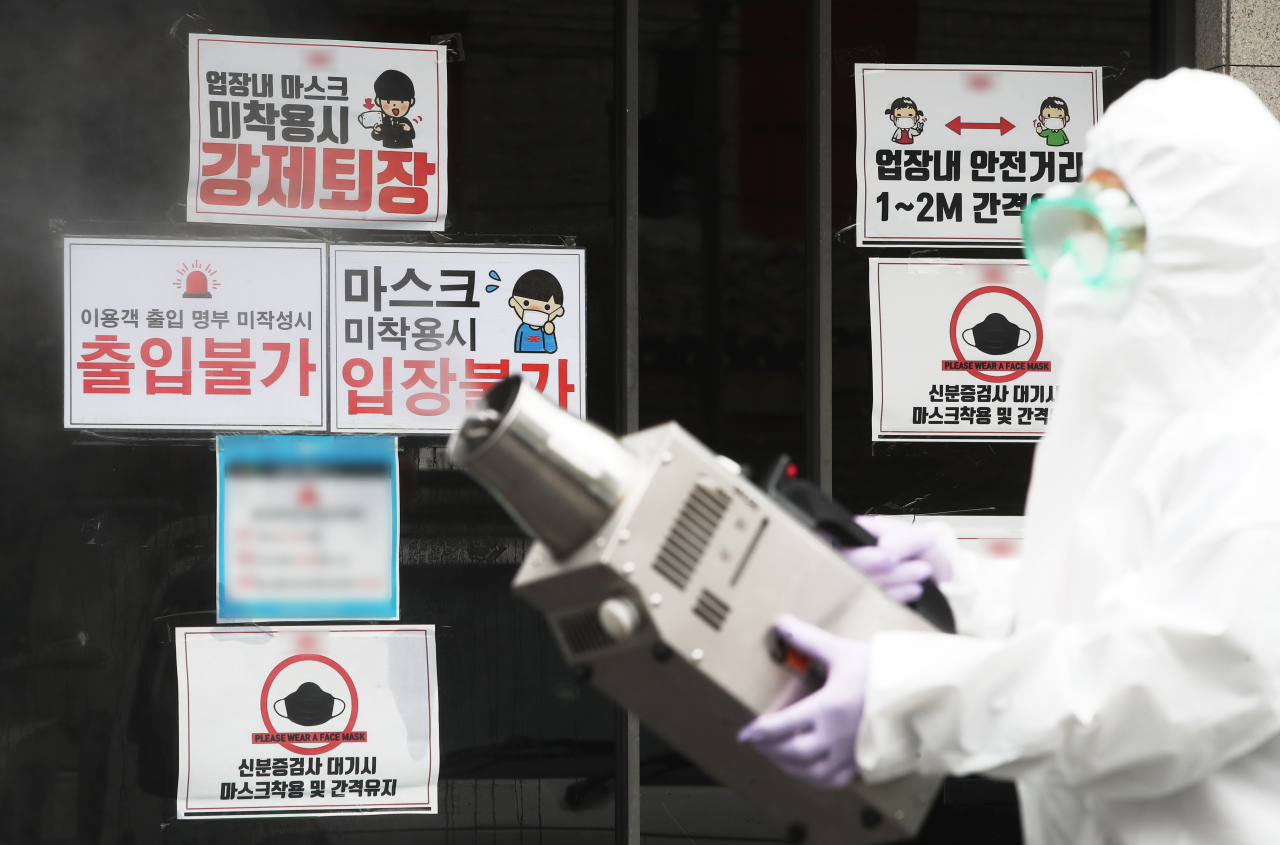S. Korea at critical juncture for virus containment amid rising Itaewon-linked infections
By YonhapPublished : May 11, 2020 - 10:26

South Korea's coronavirus containment capability is again put to the test after successfully controlling new infections for weeks, as the country braces for a sharp rise in new virus cases linked to clubs and bars in Seoul.
The country reported 35 more cases of the new coronavirus Monday, the biggest single day spike since April 9, bringing the nation's total infections to 10,909, according to the Korea Centers for Disease Control and Prevention (KCDC).
The country had been adding fewer than 15 cases of COVID-19 since mid-April, with the number of domestic infections even falling to zero at some points, before rebounding to 18 and 34 cases over the weekend.
Six of the newly added cases Monday were imported, while the remaining 29 cases were link to clubbers.
The hike in new virus cases came after a man in his 20s who tested positive for COVID-19 visited clubs and bars in Seoul's popular multicultural neighborhood of Itaewon on May 1. More than 1,500 people were believed to have visited those places during the time with the virus patient.
The number of virus infections linked to the places totaled 86 nationally as of noon, according to health authorities. Of the figure, 23 patients were families or acquaintances of those who visited the places.
By region, Seoul accounted for a large share at 51, followed by the surrounding Gyeonggi Province with 21 cases. The number of related cases from Incheon, west of Seoul, came to seven.
Patients in their 20s came to 58, followed by those in 30s with 18.
The Seoul government has secured a list of more than 5,500 people who have visited clubs in Itaewon from April 24 through Wednesday, and have made contact with more than 2,400 of them so far. Some 3,000 people, however, are still out of contact.
Health authorities said people who have visited Itaewon over the period should be tested for COVID-19, even if they do not show symptoms. Health authorities said more than a third of the confirmed patients from night clubs and bars in Itaewon did not show symptoms.
After keeping local infections at zero for a few days, South Korea saw an unexpected spike in cases coming from entertainment facilities in the popular area, with infections reported not only in Seoul but across the country.
The surge in new virus cases came as the country eased social distancing guidelines last week, and schools are set to gradually open.
Imported cases, which used to be the biggest threat for South Korea's quarantine operations over recent days, are now less of a concern.
The total number of imported cases came to 1,133.
The nation's death toll remained unchanged at 256, the KCDC said.
It marked the fourth consecutive day for South Korea to add no additional virus deaths. The mortality rate stood at 2.35 percent.
In total, 9,632 people in South Korea have recovered from the virus, up 22 from a day earlier. The figure translates into 88 percent of patients here being fully cured of the disease.
The country has carried out tests on 668,492 people since Jan. 3, including 4,606 from a day earlier.
The number of patients who were tested positive again after having recovered from the disease came to 393.
South Korea gave the go-ahead to the normalization of public facilities and other business establishments under the condition that they start following basic sanitation measures Wednesday.
Schools will also open in phases soon.
The country vowed to maintain most of the eased regulations despite the new cluster infections for the time being, although it plans to apply tougher restrictions on entertainment facilities.
Authorities also plan to decide later in the day whether the country should have students go back to schools as originally planned.
Seoul, the most populous city, imposed an administrative order to effectively suspend business at clubs, bars and other nightlife establishments Saturday. The precautionary measure will remain in place until further notice, without specifying a date.
The country remains vigilant over more cluster infections from the previous holiday that ran from April 30 through May 5, as many South Koreans made short trips across the nation. The incubation period of the COVID-19 virus is roughly two weeks.
South Korea, which started to use electronic wristbands equipped with a location-tracking system on people who violate self-isolation rules in late April, said 14 bands have been applied so far. (Yonhap)



![[Exclusive] Korean military set to ban iPhones over 'security' concerns](http://res.heraldm.com/phpwas/restmb_idxmake.php?idx=644&simg=/content/image/2024/04/23/20240423050599_0.jpg&u=20240423183955)




![[Pressure points] Leggings in public: Fashion statement or social faux pas?](http://res.heraldm.com/phpwas/restmb_idxmake.php?idx=644&simg=/content/image/2024/04/23/20240423050669_0.jpg&u=)



![[Herald Interview] 'Amid aging population, Korea to invite more young professionals from overseas'](http://res.heraldm.com/phpwas/restmb_idxmake.php?idx=644&simg=/content/image/2024/04/24/20240424050844_0.jpg&u=20240424200058)







